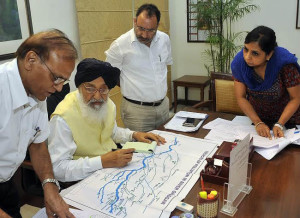
- Badal for Zero discharge treatment technology for industrial effluents
Chandigarh, Punjab Chief Minister Mr. Parkash Singh Badal would take up the serious matter of flowing heavy discharge of industrial effluents and domestic waste into the drains with the Punjab Governor Mr. Shivraj V Patil, who is also the Administrator of Union Territory of Chandigarh to seek his personal intervention for taking effective steps to prevent the reckless flow of these untreated municipal waste and industrial effluents into seasonal rivulets and drains, which ultimately merge in river Ghaggar thereby aggravating the magnitude of pollution problem manifold besides posing a major health hazard in the Punjab territory.
A decision to this effect was taken by Mr. Badal while presiding over a high level meeting to review the progress of the Ghaggar river cleaning project along with Lissara and Chand Bhan Drains. According to the mapping undertaken by the Punjab Pollution Control Board(PPCB) of the various Industrial and domestic sewer outlets within the jurisdiction of Chandigarh resulting in heavy pollution of river Ghaggar with about 2MLD discharge of untreated waste water. These sewer outlets included IT Park, Kishangarh, Bhagwanpura, Shastri Nagar, Bapu Dham Colony, Madrasi Colony and Hallomajra.
Mr. Badal would flag up this grave issue with the Union Territory Administrator so that proper treatment mechanism as per the prescribed norms could be put in place by the UT before discharging this waste water in the Sukhna Choe which ultimately polluted Ghaggar. On the Punjab’s side PPCB had identified various waste water outlets and planned to install SewerageTreatment Plants (STPs) at a cost of Rs. 9.65 crore at Zirakpur and Dera Bassi to ensure zero discharge of effluents in Ghaggar. To check the inflow of untreated Industrial as well as sewer waste water into the Ghaggar from Haryana the senior officers of both the states had already organised several meetings for which Mr. Badal asked the concerned authorities from Punjab Government to expedite the process and resolve the issue in a result oriented manner.
While monitoring the situation of Sewerage System and STPs that had already commissioned in Zirakpur with a capacity of 17 MLD (at a cost of Rs. 62.69 crore) , Sardulgarh for 4 MLD (at a cost of Rs. 18.61 crore), Mohali for 45.4 MLD, Bhikhi for 3 MLD and Samana for 10 MLD besides at Patiala where 46 MLD & at Banur where 4 MLD STPs had also been completed and were under stabilization, Mr. Badal underscored the need to expedite the work at war footing at various STPs at Rajpura, Lehra Gagga, Khanouri, Moonak, Patran, Bassi Pathana, Sirhind, Nabha, Mandi Gobindgarh, Sanour, Longowal, Sunam and Sangrur so as to make them functional in a stipulated time frame.
The Chief Minister also directed all the concerned to make use of zero discharge treatment technology in order to prevent mixing of Industrial effluents in the domestic sewers.
It was also informed in the meeting that STPs at the towns located along Lissara Drain were Rampura Phul (Rs. 22.21 crore), Kot Fatta (Rs. 6.14 crore), Bhucho Mandi (Rs. 6.69 crore), Talwandi Sabo (Rs.16.58 crore), Bathinda (Rs.85.95 crore) and Sangat Mandi (Rs. 5.36) had been completed, whereas 95% of work on STPs in Mour Mandi and 16% in Rama Mandi had already been completed.
Prominent among who attended the meeting, Principal Secretary to the Chief Minister Mr. SK Sandhu, Secretary Environment and Science & Technology Mrs. Seema Jain, Secretary Irrigation Mr. KS Pannu, Secretary Local Government Mr. Ashok Kumar Gupta, Secretary Local Government and CEO PMIDC Mr. Balamurugan, CA GMADA Mr. AK Sinha,EIC-cum-TA PWSSB Mr. VK Garg, CEO PWSSB Mr. DK Tiwari, Director Industries Mr. Raminder Singh , Mr. Ajoy Sharma and Dr.S. Karuna Raju (both Special Principal Secretary to the Chief Minister), Chairman Mr. Ravinder Singh, Member Secretary Mr. Babu Ram of PPCB.




 Driving Naari Programme launched in Chandigarh
Driving Naari Programme launched in Chandigarh






























